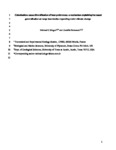Colonizations cause diversification of host preferences: a mechanism explaining increased generalization at range boundaries expanding under climate change
| dc.contributor.author | Parmesan, Camille | |
| dc.contributor.author | Singer, M | |
| dc.date.accessioned | 2021-04-28T15:07:41Z | |
| dc.date.issued | 2021-04-25 | |
| dc.identifier.issn | 1354-1013 | |
| dc.identifier.issn | 1365-2486 | |
| dc.identifier.uri | http://hdl.handle.net/10026.1/17077 | |
| dc.description.abstract |
As species' poleward range limits expand under climate change, generalists are expected to be better colonists than specialists, extending their ranges faster. This effect of specialization on range shifts has been shown, but so has the reverse cause–effect: in a global meta-analysis of butterfly diets, it was range expansions themselves that caused increases in population-level diet breadth. What could drive this unexpected process? We provide a novel behavioral mechanism by showing that, in a butterfly with extensive ecotypic variation, Edith's checkerspot, diet breadths increased after colonization events as diversification of individual host preferences pulled novel hosts into population diets. Subsequently, populations that persisted reverted toward monophagy. We draw together three lines of evidence from long-term studies of 15 independently evolving populations. First, direct observations showed a significant increase in specialization across decades: in recent censuses, eight populations used fewer host genera than in the 1980s while none used more. Second, behavioral preference-testing experiments showed that extinctions and recolonizations at two sites were followed, at first by diversification of heritable preference ranks and increases in diet breadth, and subsequently by homogenization of preferences and contractions of diet breadth. Third, we found a significant negative association in the 1980s between population-level diet breadth and genetic diversity. Populations with fewer mtDNA haplotypes had broader diets, extending to 3–4 host genera, while those with higher haplotype diversity were more specialized. We infer that diet breadth had increased in younger, recently colonized populations. Preference diversification after colonization events, whether caused by (cryptic) host shifts or by release of cryptic genetic variation after population bottlenecks, provides a mechanism for known effects of range shifts on diet specialization. Our results explain how colonizations at expanding range margins have increased population-level diet breadths, and predict that increasing specialization should accompany population persistence as current range edges become range interiors. | |
| dc.format.extent | 3505-3518 | |
| dc.format.medium | Print-Electronic | |
| dc.language | en | |
| dc.language.iso | en | |
| dc.publisher | Wiley | |
| dc.subject | climate change | |
| dc.subject | diet breadth | |
| dc.subject | extinction-colonization dynamics | |
| dc.subject | generalization | |
| dc.subject | host shift | |
| dc.subject | oviposition preference | |
| dc.subject | range expansion | |
| dc.subject | specialization | |
| dc.title | Colonizations cause diversification of host preferences: a mechanism explaining increased generalization at range boundaries expanding under climate change | |
| dc.type | journal-article | |
| dc.type | Journal Article | |
| dc.type | Meta-Analysis | |
| plymouth.author-url | https://www.webofscience.com/api/gateway?GWVersion=2&SrcApp=PARTNER_APP&SrcAuth=LinksAMR&KeyUT=WOS:000656655500001&DestLinkType=FullRecord&DestApp=ALL_WOS&UsrCustomerID=11bb513d99f797142bcfeffcc58ea008 | |
| plymouth.issue | 15 | |
| plymouth.volume | 27 | |
| plymouth.publication-status | Published | |
| plymouth.journal | Global Change Biology | |
| dc.identifier.doi | 10.1111/gcb.15656 | |
| plymouth.organisational-group | /Plymouth | |
| plymouth.organisational-group | /Plymouth/Faculty of Science and Engineering | |
| plymouth.organisational-group | /Plymouth/REF 2021 Researchers by UoA | |
| plymouth.organisational-group | /Plymouth/REF 2021 Researchers by UoA/UoA07 Earth Systems and Environmental Sciences | |
| dc.publisher.place | England | |
| dcterms.dateAccepted | 2021-02-22 | |
| dc.rights.embargodate | 2021-5-14 | |
| dc.identifier.eissn | 1365-2486 | |
| dc.rights.embargoperiod | Not known | |
| rioxxterms.versionofrecord | 10.1111/gcb.15656 | |
| rioxxterms.licenseref.uri | http://www.rioxx.net/licenses/all-rights-reserved | |
| rioxxterms.licenseref.startdate | 2021-04-25 | |
| rioxxterms.type | Journal Article/Review |


